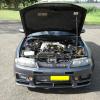Blow Off Valve / Premium Unleaded
Announcements
-
Similar Content
-
Latest Posts
-
yeah I've never understood that either.... And to answer an earlier question, I write the date on open bottles and throw them if more than 12 months old (which they almost always are, because I don't need to bleed them unless I'm changing lines/calipers etc in between)
-
Nah, the one that hit the boot was a big steel locker, around 6 foot height, 4 foot wide and 2 foot deep, empty it weighs about 15kg and had about that amount of stuff in it The photo didn't give a good representation of the actual damage, the large ding on the passenger side was about a inch deep, the one on the driver was about 1/2 inch deep, right on the curve, where the inner boot frame doesn't let you get behind it with a dolly Basically the same issue with getting behind the damage on the centre of the boot We could have filled it all with bog, but my OCD would be triggered every time I looked at it, knowing what hides beneath As for the locker, I did get the shits with it and put it in the scap metal bin, but, I pulled it out and it is now sitting in the garage at home full of car servicing stuff, cleaning gear and random tools, it's going to pay for it's indiscretions
-
By Watermouse · Posted
Who are you to deny yourself? I’ve said this many times to myself and apart from getting what I really want, I go quiet for a while whilst working out what I just did to my savings and how will I afford what it cost, then, next payday…
-




Recommended Posts
Create an account or sign in to comment
You need to be a member in order to leave a comment
Create an account
Sign up for a new account in our community. It's easy!
Register a new accountSign in
Already have an account? Sign in here.
Sign In Now